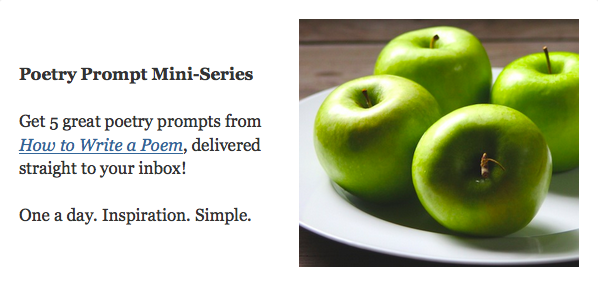
Prompt Guidelines and Options
1. Consider how you are feeling today, as you approach your topic. Are you sorrowful? Overflowing with joy or good humor? Maybe you’re in a snarky frame of mind. Or feeling perplexed. Perhaps you’re just in the mood to tell a story or express gratitude or awe. You could also consider the nature of the topic itself. Think on these things before you…
2. Choose a form that either matches or purposely works against how you feel as you approach your topic, or that matches or purposely works against the nature of the topic itself. Options:
Acrostic (good for creating puzzles and mystery or dedications)
Ballad (excellent way to tell a story)
Catalog Poem (useful for building intensity, praise, or a sense of magic)
Ghazal (helpful for emphasizing “longing” or for exploring metaphysical questions)
Haiku (good for creating immediacy or focusing in on emotion)
Ode (excellent way to praise something or someone you love or admire)
Pantoum (useful for plumbing depressive or anxious themes)
Rondeau (helpful for giving form to extremes of either sadness or dark wit)
Sestina (good for exploring confusion, questions, worries, neuroses, fears in an oblique way)
Sonnet (excellent way to confine a bombastic theme or reign in a potentially sappy or overly-sentimental theme; also an excellent way to “work against” a topic humorously)
Villanelle (useful for themes that feel resistant to answers; also can be used to “work against” a topic, using mocking humor)
3. Be specific. Think nouns instead of adjectives.
4. Consider doing a little research about the topic you are covering: its history, associated words, music, art, sculpture, architecture, fashion, science, and so on. Look for unusual details, so you can speak convincingly and intriguingly.
That’s it! We look forward to hearing you form poetically, about Things Invisible.
Click to get FREE 5-Prompt Mini-Series
Featured Poem
Thanks to everyone who participated in last week’s poetry prompt. Here is a poem from Maureen that stirred hearts and minds:
Invisible Scars
They’ve come back from war
but the fighting is not over.
They visit it in dreams, their
mind’s eye replaying it all:
how the speeding car pulls
up, brakes burning, driver’s
cell phone in hand, pressing
the single digit that renders
the morning’s market buys
un-totaled, the black abayas
a flutter of shredded threads.
Later they will have tattooed
prosthetics, tell their pretty
blonde nurses where to look
for lost and longed-for pieces.
Photo by Neil Fowler. Creative Commons via Flickr.
Browse more writing prompts
Browse poetry teaching resources

“How to Write a Poem is a classroom must-have.”
—Callie Feyen, English Teacher, Maryland
- Poetry Prompt: Misunderstood Lion - March 19, 2018
- Animate: Lions & Lambs Poetry Prompt - March 12, 2018
- Poetry Prompt: Behind the Velvet Rope - February 26, 2018

Maureen says
Thank you for featuring ‘Invisible Threads’, Heather. I also thank everyone for the comments received last week.
Heather Eure says
You are quite welcome, Maureen. 🙂
Bethany R. says
I like the breakdown of how different forms lend themselves to certain avenues of expression.
Maureen, Invisible Scars is powerful. Those first two lines pinpoint the lasting affect of deep wounds:
“They’ve come back from war
but the fighting is not over.”
Maureen says
Thank you, Bethany.
Sandra Heska King says
Maureen–yes, this is a powerful poem. The lines Bethany shared above are powerful. So is “the black abayas / a flutter of shredded threads.”
Maureen says
Thank you, Sandra.
Monica Sharman says
Invisible from the shore of the lake
Under the ripples, always awake
A twist, a whirl, a vortex churning
Below the surface, fire burning
Rumbling, almost too much to take
The water is still, the surface opaque
Yet veiled beneath, submerged, the ache
Remains—a stirring, turbulent yearning
Invisible from the shore
At this depth, something has to break
Opposing currents clash and make
A maelstrom moving, overturning
Never stagnant, always learning—
A push, a weight I cannot shake
Invisible from the shore
Bethany R. says
Love the motion and energy in your poem, Monica. I can feel it.
Monica Sharman says
Thank you, Bethany.
Monica Sharman says
Huh. I thought I put the word “pressure” in here, but it’s nowhere to be found. Maybe somewhere in the process, it became “push.”